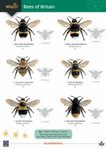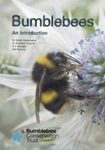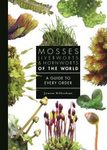By
Leon (NHBS Catalogue Editor)
8 Jul 2024
Written for Paperback

The core question driving this book is how ant colonies get anything done given that no one is in charge. Her contention, supported by a wide-ranging survey of examples, is that ant colonies function through numerous ants interacting to form a dynamic network. Stated this pithily, I admit it might not sound like much of an answer but rather a rephrasing of the question using fancy words. What do you mean, "interaction network"? If so, read on: this primer is full of fascinating biological examples and interesting insights that will hopefully clarify the above, providing you with a bigger picture of how and why ants behave the way they do.
This book follows her popular book
Ants at Work published another decade earlier in 1999. At the time of writing
Ant Encounters, Gordon had already been studying ants for some three decades, since the early 1980s, mostly the desert-dwelling red harvester ant
Pogonomyrmex barbatus. Her work and ideas formed in response to the then-prevailing view that ants are effectively genetically programmed to perform particular tasks. Her early work instead found that what ants do depends on interactions with other ants, which in turn can modify their environment, which in turn can feed back on subsequent interactions, etc. In other words, the behaviour of colonies arises from dynamical, constantly shifting networks of interactions. After introducing this concept in the first chapter, the remaining six chapters flesh it out with numerous examples at different levels of biological organization.
A logical first question to ask is what ants actually do when they meet. Communication in ants is firstly tactile, with ants using their antennae to touch each other. One of Gordon's key points is that "the pattern of interaction itself, rather than any signal transferred, acts as the message" (pp. 47–48). Experiments in harvester ants showed that what stimulated foragers to leave the nest was the encounter rate with patrollers returning in the morning. One question for Gordon I was left with was whether smell acts as a message. After all, a second important channel is chemical, with ants, like many other insects, carrying hydrocarbons on their exterior. These serve as an identity badge but also change during tasks: Gordon's work on harvester ants showed how ant odour changes as they go outside e.g. to forage. Interestingly, there is individual variation in how active ants are but this is not fixed. Remove particularly active ants and others will take up their workload; there are no "forager heroines" (p. 66).
Scaling up a little to the level of local interactions, Gordon objects to the idea of "division of labour" introduced by E.O. Wilson. He studied some of the few ant species where workers have different body sizes and tried to demonstrate that there was a caste system with size-based task specialisation. Though partially successful, even here individual behaviour changes as needed. More importantly, Gordon adds, in most ant species workers are of similar size. Whereas "division of labour" implies static procedures and permanently assigned roles, her preferred term "task allocation" highlights the dynamic, flexible nature of ant behaviour. A related idea that is scrutinized is age polyethism: tasks changing as a function of age. I encountered this in Tschinkel's book
Ant Architecture and though young ants are indeed born in the depths of the nest, the idea that they move up with age and get "promoted" to brood care, nest construction, and finally foraging is more often proposed than backed up with data in the published literature. Experiments on carpenter ants showed that if one age group was removed, others would take over their tasks, suggesting that colony needs override ant age.
Scaling up further brings Gordon to the level of inter-colony interactions, both conspecific (between colonies of the same species) and heterospecific (between colonies of different species). Interactions are both direct, e.g. encounter rate with neighbours indicating the size of their colony, and indirect, e.g. competition for food being a zero-sum game: what one colony eats is not available to the other. Bar some spectacular exceptions, fighting between conspecifics is usually avoided. In response to neighbourly interactions, harvester ant patrollers will redirect the next day's foraging trails. When it comes to heterospecific interactions, conflict has been better studied and Gordon highlights the rise of invasive ant species in the last three decades as another opportunity to do so. In general, numerical advantage trumps body size, with small-bodied species capable of simply swarming larger-bodied ones.
The final level Gordon considers is that of evolution. How did colony organization evolve from ancestors that did not live in colonies? In particular, as workers are unable to reproduce, how did worker sterility evolve? W.D. Hamilton linked it to the haplodiploid mating system of ants where females are more related to their sisters than to their daughters if a queen mates with only a single male. However, Gordon points out, many queens mate with several males, so Hamilton's maths quickly unravels, leaving the mystery of worker sterility intact. What we do know is that ants evolved from vespoid wasps. Here, worker sterility has evolved many times and shows more flexibility, with wasps able to become egg layers when needed, arguing against ants developing it through a sudden mutation. The matter remains unresolved, but Gordon does think that describing social structure in terms of who lays the eggs is "misleading language [that] directs attention away from everything else that makes up the diverse and complex social organization of ant colonies" (pp. 130–131).
If all of the above left your head spinning somewhat, then you are not alone. There are some really interesting challenges to established ideas in this slim book, but it took some effort to distil these key points. This book presents a bewildering variety of examples from many different species, reflecting the state of play in myrmecology. A recurrent theme is that we have extremely limited data. Of the approximately 11,000 ant species known to exist, only 50-odd have been studied in any detail and even then only in fragmentary fashion. "What we have so far are only some of the pieces of many different puzzles; fragments of the picture for army ants, other pieces for harvester ants, others still for fire ants, and so on" (p. 144). Even in this limited sample, exceptions and diversity abound. A brief final chapter considers what it would take to construct models of ant behaviour. This would come to occupy Gordon for the next decade, resulting in the recent publication of
The Ecology of Collective Behavior to which I will turn next.





































